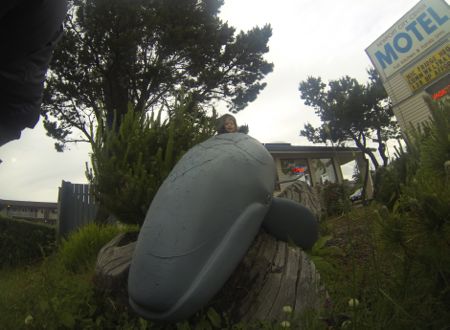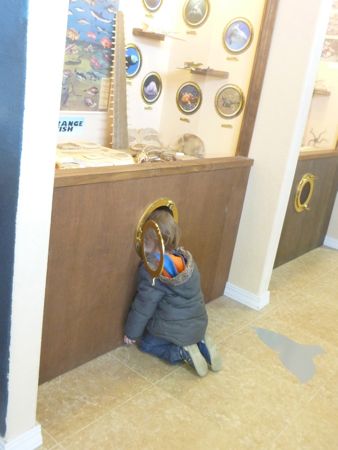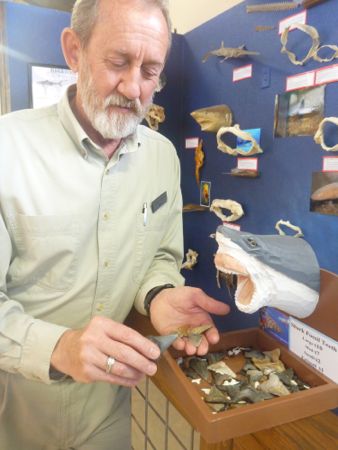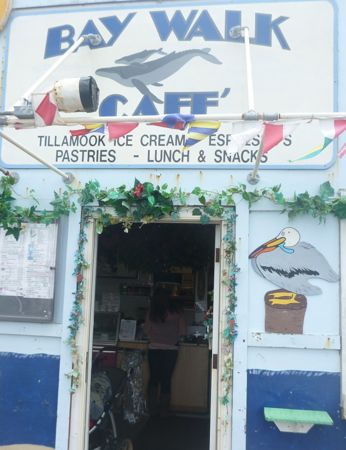Our next stop following the grey whale migration is Depoe Bay, which calls itself Oregon's whale watching capital.
Getting there by public transport is a challenge. I've navigated this journey remotely from the UK, exploring countless dead ends. I couldn't find a tourism center in Depoe Bay so I called the Chamber of Commerce and discovered Kitty, a mine of information. By the time I finally nailed our route she recognized my voice, greeting me by name when I called.
Imagining the whales' difficulties during their epic journey makes mine pale into insignificance. How they navigate is a mystery. One theory is that their spectacular hearing allows them to follow the coastline by sounds of waves on the shore, or of creatures hanging out in the kelp beds.
Some suggest they use landmarks, spy-hopping with heads above water to see cliffs and beaches, or perhaps are guided by the earth's magnetic field.
None of these methods help me. I'm clutching a detailed itinerary and we're on a tight schedule. We'll have one day in Depoe Bay because we need to catch a boat to Alaska that leaves Vancouver soon.
First step, overnight train to Albany. Javier, the train attendant, chats as he works. He's from near Chihuahua, Mexico, has a wife and three children, and supports family back home too. At breakfast time we stagger off in the direction he's pointing, ricocheting through the corridors, my son delighting in the kick-buttons that spring the doors open between cars.
We sit opposite a retired 'flight-doc' who tells stories of working as a medic with fighter pilots, 'Top Gun style', he says, in-between bacon and eggs. After battle simulations over the sea, the pilots would sometimes 'buzz' whales, sneaking up on them, he divulges. Another favorite game was to try and make the flight doc throw up by performing acrobatic stunts. "Did they manage?" I ask, "No", a pause, 'Once."
At lunch we meet Dick Burkhart. Dick's an expert on public transport from Seattle and volunteers with the Sierra Club environmental organization. He sympathizes as I grumble about our tortuous route. Next to him, a fragile looking man, an Anglican priest, with plasters covering his bruised arms, complains that in LA, there was no bus to the hospital where he was being treated.
"Public transport in the U.S. is pretty hit or miss," explains Dick, "mostly miss. It's great in a few big cities like New York and mediocre to non-existent for most smaller cities. Ridership and enthusiasm are growing though. In Seattle we love our new light rail. Even President Obama is a champion for rail. But getting funding for Amtrak out of Congress is always a struggle."
In Albany there's a wait before our bus, to the town of Newport, but I daren't go anywhere in case it's early. The next one's tomorrow. Luckily Kevin emerges from behind the ticket counter. He's a station manager straight out of a children's story and showers the two-year-old with train books, puzzles and an engineer's hat. The wait flies past.
The bus route plunges us into shady forest. This bus leaves on the return journey at the nauseous hour of 5:30 a.m.. When I tell our driver we're coming back in two days, he offers to stop at our hotel. I am so incredibly grateful I tip him more than the fare, praying that he'll remember and won't shoot past us in the dark.
The next day I'm woken by heavy rain on the hotel window. I roll over. The phone goes. It's the whale watching company. No boats are going out today, by order of the coastguard, because it's too rough.
I feel grey. We eat grey porridge for breakfast. Outside there's grey rain, grey sky, grey buildings. No sodding grey whales, apart from a plastic one outside the hotel.

We are directed to the wrong bus stop and miss the bus to Depoe Bay. Three hours until the next one. I curse buses, whales, the weather and my stupidity for undertaking such a ridiculous journey.
The Bay, when we eventually get there, is pretty, even in the rain. Taking shelter in a whale museum, we're greeted by Morris Grover. He shows us the exhibits, including a collection of fossilized shark teeth and a mounted head of a bull shark.

The bull shark, says Morris, is the true star of the book Jaws. Great white sharks are more photogenic, he explains, but the bull shark is the real terror of the seas. I am suitably impressed and a little cheered up.

When a bright spot appears through the clouds, we rush out to stare at the sea and find another family hailing from Nashville doing the same. Then another downpour sends us running into a cafe.

Inside is Clyde Ramdwar serving 'nearly famous' homemade chowder, fries and brownies. His food is great but his story is better. Clyde is 'retired.' He's part Venezuelan, part Indian and grew up in Trinidad. He left, as a teenager, on a ship bound for Chile and washed dishes. Ten years later he was a marine engineer on oil tankers sailing from Saudi Arabia to Brazil.
"What are you doing here?" Clyde asks, puzzled. "We following migration of thurr grey whales," pipes up the two-year-old cheerfully. We both do a double take.
Clyde loves the West Coast of the U.S. Working in New York he was horrified to see people stepping over a man collapsed on the sidewalk. Depoe Bay is home but the kelp near the shore means he can't pursue his beloved hobby of fishing, so Trinidad beckons.
Leaving the café with Clyde's epic journeys echoing in my ears I muse over how his path has intertwined with the whales. Like him, some greys interrupt their travels in Depoe Bay. 'Resident' whales stay ten months of the year. I wonder if the whales find comfortable places to wait out storms. Are they helped and cheered by creatures on the way, as we have been, at every step, by the kindest people?
Our heroic bus driver collects us at 5:35 the following morning. Goodbye Depoe Bay. You kept your mysterious visitors hidden but we discovered some treasures anyway.
We've traveled more than 1,500 miles and not seen a single whale since we patted them in Mexico. I'm hoping our luck will change as we approach Canada.
Shoving a toy whale mascot in my face, the two-year-old sings, cheering the early morning dark. He's on message, 'Whales, we're coming to find you'.